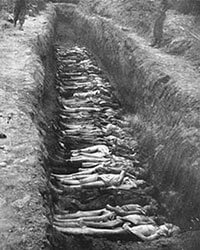Chapter XVI: The Psychological Interpretation of Culture and History
|
||
Hannah Arendt observes that only people who are “no longer ruled by the common motives of self-interest and common sense” could indulge in convictions that “for all immediate practical purposes” (winning the war or exploitation of labor) were “quite obviously self-defeating.” Social scientists, Arendt says, have great difficulty understanding a phenomenon when “behavior patterns and motives usually identified with human psychology are abolished;” where objective necessities “conceived as the ingredients of reality itself” are neglected. Motivations for the Final Solution do not fall under the rubric of “self-interest.” There were no “practical” reasons for the murder of six-million Jews. This does not mean, however, that it is impossible to explain the Holocaust. We begin by recognizing that the Nazis—in performing the Final Solution—were enacting a certain kind of fantasy. Explanation consists, therefore, of uncovering the Nazi fantasy, and interrogating its meaning. Ronald Aronson, like Arendt, notes that the “functionalist bias” of most systematic thought assumes there is a “reason” for every societal act, a more or less “rational intention behind practical action.” He says that it “offends the intellect” to suggest there is “no reason” behind a major policy, or that instead its reason is “profoundly or systematically irrational.” How is one to understand a social institution that seemed to have no rational purpose? The intellect is “offended” by the Final solution only if one approaches it with the assumption that there are “rational intentions” behind political action. Why do so many insist on making this assumption—even after one-hundred hears of Freud? Why so much resistance toward viewing political action—behavior in culture——as actions that are motivated by the same unconscious desires and fantasies that motivate individual behavior. I must confess I have found no greater impediment to understanding the Holocaust and other forms of political violence—than this stubborn attachment to the idea that behavior in politics is governed by “rationality.” Indeed, perhaps someday I will explore this destructive “fantasy of rationality” that is so common in efforts to explain historical phenomena. Steven Katz asks: Has there ever been a comparable example of so much disciplined planning and modern technological know-how, so much specialization and concern with efficiency, being harnessed and used solely to murder a noncombatant civilian population—where a technology came into being and had its sole raison d’être the murder of a segment of one's own and then one's subject population? An entire sophisticated industry, Katz observes, and much of the energy of the German nation, were devoted “solely to the production of corpses.” Everything from the making of trains to carry victims, to the making of gas chambers to gas the victims, to ovens to burn the victims, to the communications that controlled the entire process—was the end product of a technologically advanced civilization which decided to “turn its economy, as well as its inmost soul, over to manufacturing death.” This characterization of the Nazi movement is significant—and accurate. The energy of the German people was devoted to “producing corpses;” to “manufacturing death.” Once we abandon the idea that rational motives generated Nazism and the Holocaust, we can focus on what Hitler sought to do, and what he actually did. Perhaps one might best sum up the Nazi period by stating that they “Killed a lot of people.” This parsimonious understanding allows us to account—not only for Holocaust victims, but for the deaths of millions of enemy soldiers and civilians who died during the Second World War; not to mention millions of German soldiers and civilians who died as a result of the Nazi reign of terror. The core question is: “Why did Hitler will the deaths of so many people?” Why did he want millions of human beings to die? |
